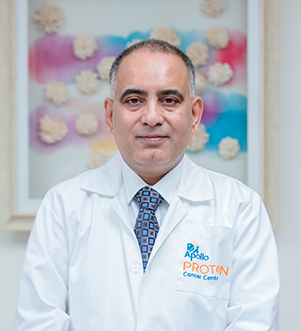DR. T. RAJA, DIRECTOR – MEDICAL ONCOLOGY, CANCER CARE: A WAR ON TWO FRONTS
Date: 2020-04-24 | Location: Chennai
COVID-19 is more severe in the elderly population and people with underlying medical conditions, including cancer (present or past history). A number of studies from China and Europe have shown that the prevalence of cancer in patients with COVID-19 is 2%.
Like other cancer patients, brain tumour patients can be at an increased risk of COVID-19 infection due to their immunocompromised state caused by the tumour and treatments given to them.

The data from the tertiary cancer institution of Wuhan University showed a two-fold increased risk of COVID-19 in comparison to the general population. Cancer patients are more susceptible to the infection. There is significantly higher incidence of death or ICU admissions.
A report from Italy states that 20% of deaths due to COVID-19 were in active cancer patients. Statistics suggest that mostly men with lung cancer are affected.
Patient management
The initial steps of outpatient management are to minimise face-to-face contact using tele consultations and medicine delivery at home. Most cancer centres have established symptom screening for all stakeholders. If suspicious symptoms arise they are referred to the triage and later to treating facilities.
Second, it is important to educate the patient and family for prevention. The new mantras are to ensure the continuum of care, get prepared for a new routine, protect healthcare workers to protect patients and reinforce support.
Several patients need imminent cancer care and it becomes imperative to tackle treatment decisions. These patients can be approached whether they have a COVID-19 situation or not.
Cancer patients with new respiratory symptoms or with known COVID-19 exposure are highest priority for COVID-19 testing
For those cancer patients who test positive, anti-cancer therapies are withheld for the duration of the illness.
The patient must be retested after symptom resolution twice and cancer treatment can go on after getting two consecutive negative results within a 48 hours.
Prioritising Anti-cancer treatment:
- L1: Curative treatment with a high (> 50%) chance of success
- L2: Curative treatment with an intermediate (20% - 50%) chance of success
- L3: Curative treatment with a low (10% - 20%) chance of success
- L4: Curative treatment with a very low (0% - 10%) chance of success
- L5: Non-curative treatment with a high (> 50%) chance of palliation or temporary tumour control
- L6: Non-curative treatment with an intermediate (15% - 50%) chance of palliation or temporary tumour control (*L-Level)
Similarly, brain tumour patients requiring chemotherapy should get priority based on their diagnosis (type and grade of brain tumour).
Risk of progression
- Balancing risk from treatment delay vs. harm from exposure to COVID.
- Based on low risk of progression – safe to delay for more than three months.
- Based on intermediate risk of progression – delay of three months may be acceptable.
- For patients with high risk of progression – there should be no delay in treatment for cancer patients under the age of 70.
Chemotherapy guidance
- Patients in deep remission who are receiving maintenance therapy, stopping chemo can be an option
- In patients where adjuvant chemo benefit may be minimal, hormonal therapies can be considered
- Oral chemo and home infusions can be an option to consider
- Heavily infected patient: Consider altering chemo schedule so lesser visits to hospitals
- Immuno therapy: At this time no data available on the kind of impact of immunotherapy on COVID-19 infected patients. However, concern is on immue-related pneumonitis – which could increase the complications due to COVID-19
- Allogenic Hematopoietic Cell Transplantation: Prudent to test potential donors, though there is absence of evidence of blood transmission

Winning over Cancer with Apollo Proton Cancer Centre
The growing burden of cancer across the globe tells an ominous tale. To counter this growing threat, Apollo Hospitals introduces Proton Beam therapy with focused cancer management teams that will provide optimal solutions like never before. We believe it is critical to redefine our purpose, to reboot our commitment on the single-minded focus to win over cancer. APCC stands as a ray of hope for millions of patients as they join us in the battle to win over cancer.

Copyright © 2023 Apollo Proton Cancer Centre. All Rights Reserved





